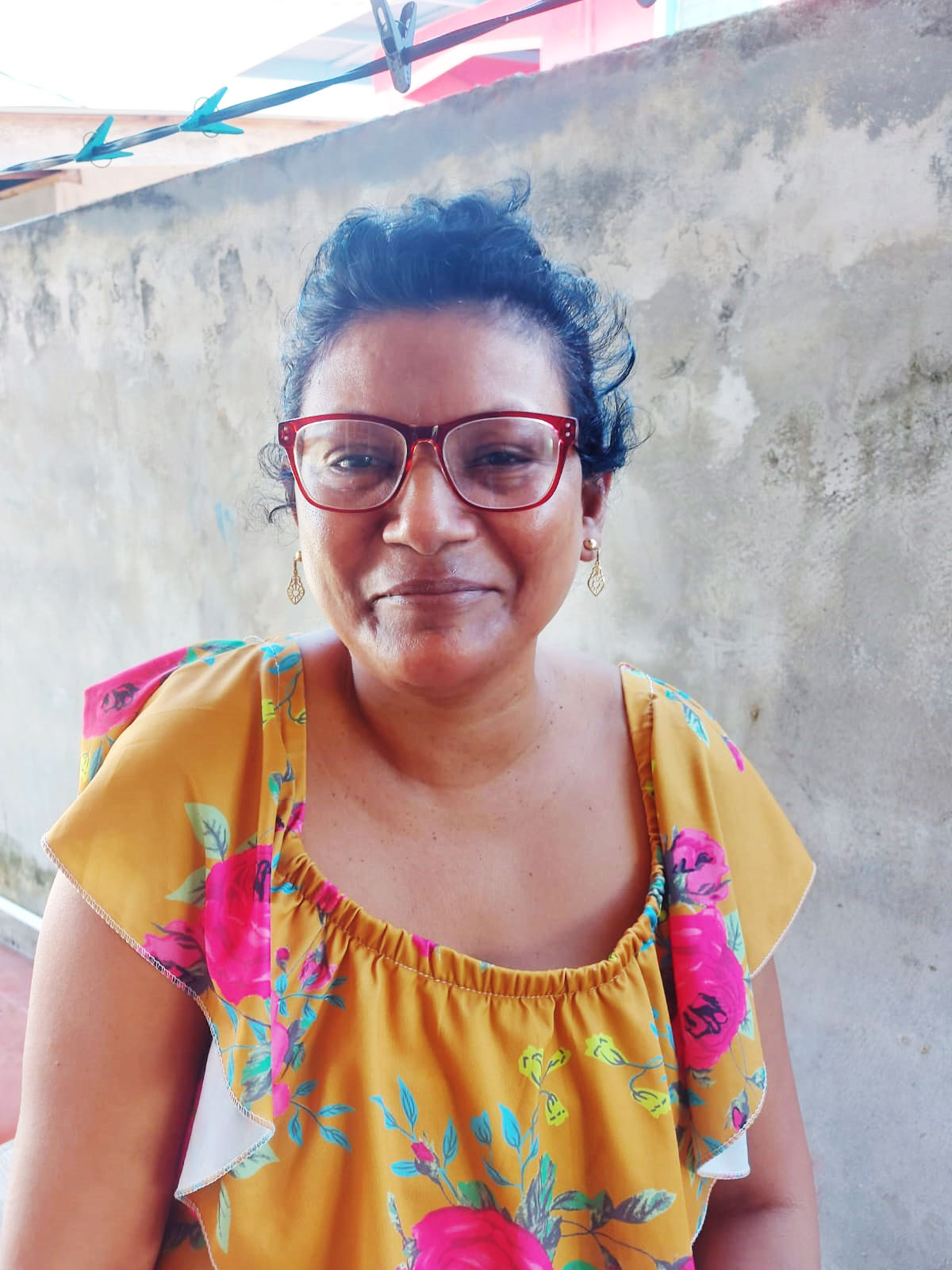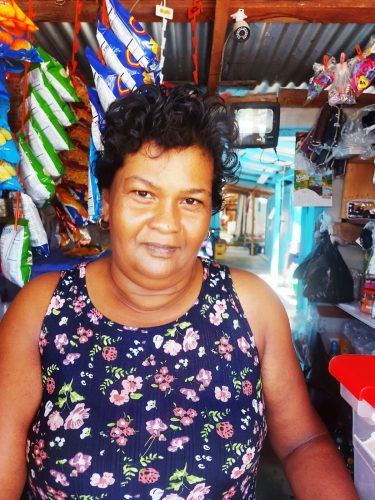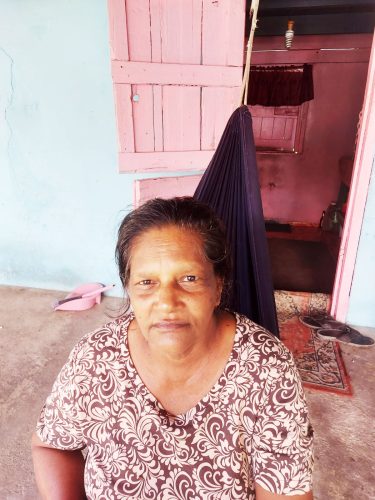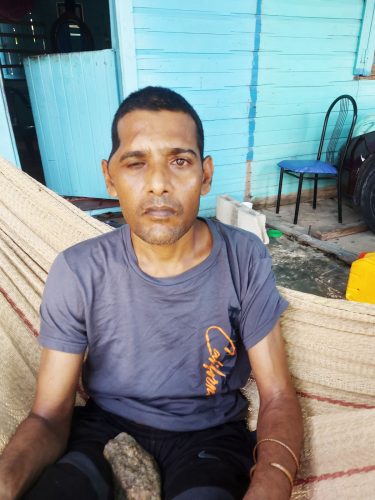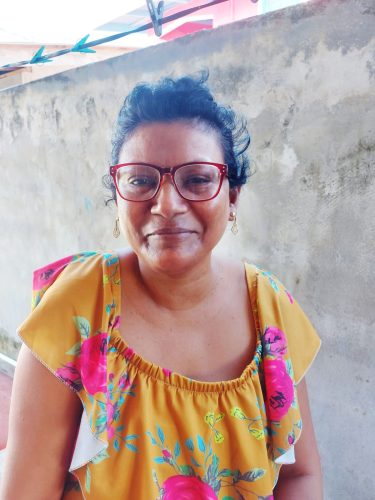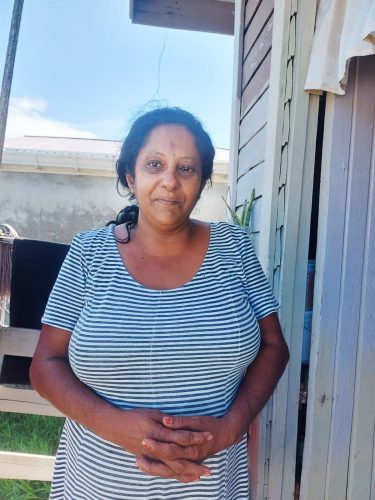Part 77
Stabroek News spoke to members of the public in Zeelugt, East Bank Essequibo about the rising cost of living and how it is affecting them. The following are their comments:
Interviews and photos by Subhana Shiwmangal
Azad Hussain
Azad Hussain, a 51-year-old vendor said: “I’m trying with the high cost of living. The cost of living is a little hard for me because I’m living alone and the finance and the high prices in the market affects me a lot. My main source of income comes from the snacks and other things I sell from my home. Sometimes I get support from my brother. For example, the cost for a three-litre cooking oil before was about $1,400/$1,600; now the cooking oil cost $2,500. A pound of plantains a couple months back cost $160/$140; now a pound of plantains cost $200. The prices for items in the market are going up every day. If there could be a reduction for the cost of food items that will be good.”
Sugrim
Sugrim said: “Sometimes I find the cost of living hard because the small grocery business that I run from my home does not help my husband and I out much. My husband receives pension. We try to cope with the cost of living by crediting goods to customers and then receive money for the items later. Sometimes, we find that the cost for items increases in the market while sometimes it reduces. Right now, the cost for one, one thing gone up…For example, before a pound of plantains cost $100; now I’m buying two pounds of plantains for $500/$300 some places. I’m lucky if I get to buy the plantains directly from a farmer which will cost $120 a pound on the bunch. The cost for a 10kg Karibee rice a couple months back was $1,800 and something; now the same bag of rice cost $2,100. Even the cost for cooking gas gone up. Before a 20 lb cylinder cooking gas cost $4,300/$4,200; now the gas cost $4,400. I think it’s how the farmers get the items, so we just have to cope with the cost of living because the cost of food items depends on the season of the items.”
Balram Sammy
Balram Sammy, a 52-year-old sluice attendant said: “The cost of living is affecting my family and I seriously because public service workers’ salary is not enough to buy grocery items for the home. We just have to cope with the cost of living. We cannot do anything about the high cost of living. We just have to budget to buy what we need. I’m a family of three persons which includes my wife, son and me. I’m the only one working to maintain the home. The prices for items in the market fluctuates. For example, A couple months back a 20 lb cylinder cooking gas cost $4,100; now the gas cost $4,400. Every month you go to the market, the cost for something always going up. When the cost for rice drops a little, the cost for a pound of flour goes up. The prices for greens fluctuate in the market. It has its season, for example, a couple months back a small bundle bora cost $600; now the same bundle of bora cost $1,200. The government has to work on reducing the high cost of living and increase workers’ salary.”
Vidya Persaud
Vidya Persaud, a 30-year-old housewife said: “The cost of living is affecting my family and I, especially because we have kids to support. I have three kids. I’m a housewife and my husband work to provide for us. I find the cost of living a little difficult because my husband’s salary is not raising but the prices for the items in the market are high. Well, we would usually budget in order to buy items for the kids, then we have to purchase grocery items and pay bills. For example, a medium size pack of Predo baby diapers a couple months back cost $1,680; the diapers now cost $2,200. A big tin of Infant Lactogen formula before cost $2,800; now the formula cost $3,780. The cost for a lot of groceries items gone up in the market, such as: rice, toilet paper, oil; a few months ago, these things wasn’t so expensive. The government should reduce the prices for food items because when the budget came out, we thought we could afford to buy food items but the prices for the items went up more.”
Mangri Sanichar
Mangri Sanichar, a 59-year-old: “The cost of living is high and it is affecting my family and I a lot because the prices for the items have gone up in the market. I’m unable to buy grocery items I need sometimes because I try to make sure the public assistance I receive, can buy things my grandchildren need to go to school and eat, not forgetting the daily transportation and lunch money I gave them on a daily basis. I have a sister who receive public assistance for that is hard of hearing, and I try to use that to buy grocery items and other items for her. I don’t get to buy all the groceries I need but whatever I buy, I try to make do of that; there is utility expenses I have to cover also. The prices for items gone up in the markets. For example, a 10 kg Karibee rice a few months ago cost $1,900; now the rice cost $2,300 and something. A pound of peppers before cost $300; now a pound of peppers cost $1,200. I have noticed that the tax on imported items is high and that’s why most of our imported items are expensive. The government should at least reduce the tax on imported items to help with the rising cost of living.”
Terrence Singh
Terrence Singh said: “Whenever I go to the supermarket/shop the cost for an item raise. I have three kids going to school and the cost of living is affecting me because I’m now spending less on my children and I have problems with keeping up to date with the utility bills. My wife does not work and I can’t work at the moment because I’m sickly. Since January, I’m not working because of my stroke. I’m a construction worker. I’m just using up money from my savings to provide for my family. I don’t know when I will get better. For example, before a medium pack Natura milk cost $500; now the milk cost $560. A 10 kg Karibee rice a couple months ago cost $2,000/$1,900 in the supermarket; now the rice cost $2,300. Everytime I go to the market, the prices go up by $60 more. I think the government should keep import tax on imported items such as cars, tin items and other imported items at a certain level, so when the supermarkets do their mark-up, the price would not go pass the usual shelf price.”
Rihanna Kumar
Rihanna Kumar, a 24-year-old caregiver said: “Some cost for items have gone up in the market and shops while some items have gone down. The cost for most greens has gone down in the market. Both my husband and I are working to provide for the home. He pays child support so I try to pitch in when necessary. I don’t get pay much but I try to make do with what I have to cover the monthly expenses. For example, a 20 lbs cylinder cooking gas before cost $5,000; now the gas cost $5,300. Even the cost for a 900ml bottle oil gone up. The government should work on increasing people’s salary to help people with the cost of living.”
Darshini Singh
Darshini Singh, a 47-year-old housewife said: “I’m trying to cope with the high cost of living. My family and I can’t even get to save with the high cost for items in the market. Then, we have utility bills and other expenses to pay. My husband, son and I live together. My husband is the sole provider for the home. The prices for things have gone up in the market. For example, a 10 kg Karibee rice a few months ago cost $1,400; now the rice cost $1,800. A pound of chicken before cost $460; now a pound of chicken cost $560. Even the cost for sugar gone up in the market. I think the government should increase people’s pay more to help with the high cost of living.”
Chandrouti
Chandrouti, a 52-year-old single mother said: “Sometimes when I go to the market and buy couple grocery items, I can’t afford to buy greens because the cost for all food items have gone up in the market. Only my two sons are working to provide for the home. I’m a family of five. The cost of living is hard on me because sometimes when I buy groceries and other things, I don’t get to save anything. For example, a 1-litre cooking oil a couple months ago cost $300; now the oil cost $460. Before a 20 lb cooking gas cost $4,100/$4,200; now the gas cost $4,500. The government should try to do something about the high cost of living because this is hard, especially for single mothers.”
Guitra Kumar
Guitra Kumar, a 29-year-old single mother said: “Right now the prices for everything have increased in the market. I’m a single mother of three children and the cost of living is affecting me because I don’t work for a lot of money and the little money I have I try to cope with it. I budget in order to buy grocery items, send my children to school and to pay the utility bills. For instance, before a couple of bora cost $100; now the couple of bora cost $200. Also, a pound of chicken a couple months back cost $560; now a pound of chicken cost $600. The government need to help everybody in the community with the cost of living, not just one section of the community because since the government last visited the area, only a section of the community received help from the government. “
